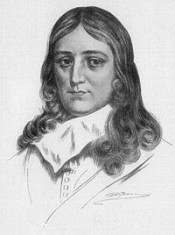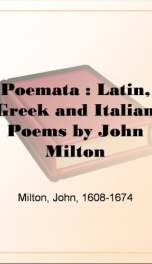Milton John

John Milton (9 December 1608 – 8 November 1674) was an English poet, author, polemicist and civil servant for the Commonwealth of England. He is best known for his epic poem Paradise Lost and for his treatise condemning censorship, Areopagitica. He was both an accomplished, scholarly man of letters and polemical writer, and an official serving under Oliver Cromwell. His views may be described as broadly Protestant, if not always easy to locate in a more precise religious category. Milton was writing at a time of religious and political flux in England, and his poetry and prose reflect deep convictions, often reacting to contemporary circumstances. He wrote also in Latin and Italian, and had an international reputation during his lifetime. After his death, Milton's personal reputation oscillated, a state of affairs that has largely continued through the centuries. He early became the subject of partisan biographies, such as that of John Toland from the nonconformist perspective, and a hostile account by Anthony à Wood. Samuel Johnson described him as "an acrimonious and surly republican"; but William Hayley's 1796 biography called him the "greatest English author", at a time when his reputation was particularly in play.[2] He remains, however, generally regarded "as one of the preeminent writers in the English language and as a thinker of world importance."[3] One can situate both Milton's poetry and his politics historically. The phases of his life closely parallel major historical divisions of Stuart Britain. Under the increasingly personal rule of Charles I and its breakdown in constitutional confusion and war, Milton studied hard, travelled, wrote poetry mostly for private circulation, and launched a career as pamphleteer and publicist; a more detailed treatment can be found at John Milton's early life. Under the Commonwealth of England, from being thought dangerously radical and even heretical, the shift in accepted attitudes in government placed him in responsible public office, and he was acting as an official spokesman in certain of his publications. The Restoration of 1660 deprived Milton, now completely blind, of his public platform, but this period saw him complete most of his major works of poetry. Milton had a great impact on the Romantic movement in England, as was shown in fellow poet William Wordsworth's London, 1802. Wordsworth calls upon him to rise from the dead and aid in returning England to its former glory. Milton's views developed from his very extensive reading, as well as travel and experience, from his student days of the 1620s to the English Revolution.[4] By the time of his death in 1674, Milton was impoverished and on the margins of English intellectual life, yet unrepentant for his political choices, and of Europe-wide fame. John Milton was born 9 December 1608 to a prosperous and cultured middle class Puritan family. His family consisted of his grandmother who lived with them until 1611, his older sister Anne (birth date unknown), and his younger brother Christopher (1615). He had two additional sisters, Sara and Tabitha, who died at infancy. John Milton’s father, also named John Milton, was born in 1562 and died in 1647. He was cast out of his family when his father, Richard Milton, discovered him reading a Bible in English. Richard Milton was a strong believer in the Roman Catholic faith. John moved to London in 1583. He joined the Company of Scriveners. His profession combined the functions of a notary, financial adviser, money lender and contract lawyer. He drew bonds between lawyers and borrowers, invested money for others, bought and sold property, loaned money at high interest rates, and gave depositions for legal cases. He also composed madrigals and psalms. Milton’s mother, Sara Jeffrey (1572–1637), was the eldest daughter of a merchant tailor. She was described as a “woman of purest reputation, celebrated throughout the neighborhood through her acts of charity.” In Milton’s childhood and much into this teen years, he attended church where Richard Stock was the minister. Stock had a profound influence on John Milton, and died shortly before Milton started university. They shared the same beliefs of “antipapist diatribes and the readiness to censure the sins of the powerful.” John developed many attitudes and character traits that lasted with him throughout his lifetime. He held in such regard human institutions of marriage, school, church, government, and had a ‘disposition to challenge and resist institutional authorities who fell short of such standards.” At a young age, Milton became conscious of political, religious and cultural strains on the nation. His father's prosperity provided his eldest son with a private tutor, Thomas Young, a Scottish Presbyterian who may have influenced his gifted student in religion and politics while they maintained contact across subsequent decades[5], and then a place at St Paul's School in London. There he met Charles Diodati, a fellow student who would become his confidant through young adulthood. He also began the study of Latin and Greek, and the classical languages left an imprint on his poetry in English (he wrote also in Italian and Latin). He may have heard some poetry from John Donne, dean of St. Paul's Cathedral. His first datable compositions are two psalms done at age 15 at Long Bennington. One contemporary source is the Brief Lives of John Aubrey, an uneven compilation including first-hand reports. In the work, Aubrey quotes Christopher, Milton's younger brother: "When he was young, he studied very hard and sat up very late, commonly till twelve or one o'clock at night".[6] ‘My father,’ Milton wrote in 1654, ‘destined me in early childhood for the study of literature, for which I had so keen an appetite that from my twelfth year scarcely did I leave my studies for my bed before the hour of midnight.’ John Milton enrolled at Christ's College, Cambridge, in 1625 to be educated for the ministry. He was temporarily expelled because of a conflict with one of his tutors, William Chappell and later reinstated with another tutor, Nathanial Tovey.[7] He graduated with a Bachelor of Arts degree in 1629,[8] ranking fourth of 24 honours graduates that year in the University of Cambridge,[9] and a Master of Arts degree in 1632. He was at home in the Lent term 1626; there he wrote his Elegia Prima, a first Latin elegy, to Charles Diodati. Based on remarks of John Aubrey, Chappell "whipt" Milton.[6] This story is now disputed. Certainly Milton disliked Chappell.[10] Christopher Hill cautiously notes that Milton was "apparently" rusticated, and that the differences between Chappell and Milton may have been either religious or personal, as far as we can know.[11] Another factor, possibly, was the plague, by which Cambridge was badly affected in 1625. At Cambridge Milton was on good terms with Edward King, for whom he later wrote Lycidas. He also befriended Anglo-American dissident and theologian, Roger Williams. Milton tutored Williams in Hebrew in exchange for lessons in Dutch.[12] Otherwise at Cambridge he developed a reputation for poetic skill and general erudition, but experienced alienation from his peers and university life as a whole. Watching his fellow students attempting comedy upon the college stage, he later observed that 'they thought themselves gallant men, and I thought them fools'.[13] Milton, due to his hair, which he wore long, and his general delicacy of manner, was known as the "Lady of Christ's College". While studying at Cambridge, he recognized that poetry and life are closely related: "And long it was not after, when I confirm'd in this opinion, that he who would not be frustrated of his hope to write well hereafter in laudable things, ought him selfe to bee a true Poem, that is, a composition, and patterne of the best and honorablest things; not presuming to sing high praises of heroick men, or famous Cities, unless he have in himselfe the experience and the practice of all that which is praise-worthy."[14] He also found alternatives between life and poetry. These alternatives included "sensuous delight and asceticism, eroticism and chastity, retired leisure and arduous labor, academic oratory and poetry, classical and Catholic myth, Latin and English language, elegy, and the higher poetic forms, mirth and melancholy." His poems contained the dating formula of 'anno aetatis' which means "written at the age of.".[14] The university curriculum was dour, and worked towards formal debates on topics, conducted in Latin. Yet his corpus is not devoid of humour, notably his sixth prolusion and his epitaphs on the death of Thomas Hobson. While at Cambridge he wrote a number of his well-known shorter English poems, among them On the Morning of Christ's Nativity, his Epitaph on the admirable Dramatick Poet, W. Shakespeare, his first poem to appear in print, L'Allegro and Il Penseroso. Despite his intention to enter the ministry, he did not. It is possible that he did not due to the lack of respect for his fellow students who were also planning on becoming ministers, or his Puritan inclinations caused him to dislike the hierarchy of the established church, and its insistence on uniformity of worship. Either way, his obvious dissatisfaction impelled the Church of England to reject him from the ministry.[15] In 1632 Milton returned to live with his parents in Hammersmith, on the outskirts of London. Three years later, perhaps because of the plague outbreak, the family moved to Horton, Berkshire, and Milton undertook six years of self-directed private study. Christopher Hill points out that this was not retreat into a rural or pastoral idyll at all: Hammersmith was then a "suburban village" falling into the orbit of London, and even Horton was becoming deforested, and suffered from the plague.[16] He read both ancient and modern works of theology, philosophy, history, politics, literature and science, in preparation for a prospective poetical career. Milton's intellectual development can be charted via entries in his commonplace book, now in the British Library. As a result of such intensive study, Milton is considered to be among the most learned of all English poets; in addition to his years of private study, Milton had command of Latin, Greek, Hebrew, French, Spanish, and Italian from his school and undergraduate days; he also added Old English to his linguistic repertoire in the 1650s while researching his History of Britain, and probably acquired proficiency in Dutch soon after.[17]
do you like this author?
What readers are saying
What do you think? Write your own comment on this book!
write a commentWhat readers are saying
What do you think? Write your own comment on this author!
write a commentBook list

Areopagitica
A speech for the Liberty of Unlicensed Printing to the Parliament of England
Series:
Unknown
Year:
Unknown
Raiting:
4.5/5
Show more
add to favoritesadd In favorites

Poemata : Latin, Greek and Italian Poems by John Milton
Series:
Unknown
Year:
Unknown
Raiting:
1.5/5
In this book John Milton collected the works of Latin, Greek, and Italian poets. Readers will be amazed by this unbelievable trip to the world of poetry.
Show more
add to favoritesadd In favorites
Book list

Areopagitica
A speech for the Liberty of Unlicensed Printing to the Parliament of England
Series:
Unknown
Year:
Unknown
Raiting:
4.5/5
Show more
add to favoritesadd In favorites

Poemata : Latin, Greek and Italian Poems by John Milton
Series:
Unknown
Year:
Unknown
Raiting:
1.5/5
In this book John Milton collected the works of Latin, Greek, and Italian poets. Readers will be amazed by this unbelievable trip to the world of poetry.
Show more
add to favoritesadd In favorites
What readers are saying
What do you think? Write your own comment on this author!
write a commentif you like Milton John try:
readers also enjoyed
What readers are saying
What do you think? Write your own comment on this author!
write a commentGenre
if you like Milton John try:
readers also enjoyed
Do you want to exchange books? It’s EASY!
Get registered and find other users who want to give their favourite books to good hands!

